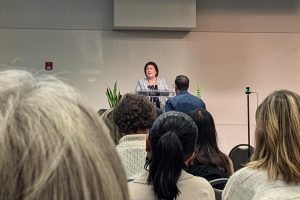Music students struggle to compose
October 9, 2020
In a time before COVID, many music students and non-music majors living on or off-campus had access to the music department’s state of the art recording studios, along with the three other buildings on campus utilized by the department.

Now the process to practice in a building on campus looks very different and only music majors living in the residential halls or campus apartment have access to practice rooms. Normally, a student would scan their ID to enter Nickerson Studios or Crawford Music Hall, and could walk into any open practice room.
During these unprecedented times, the music department has found a new way for students to safely and effectively use practice rooms.
At the beginning of the quarter, it took more effort to find a quiet place to practice on campus. Musicians had to log on to SPU’s room finder, find a room that suits their musical needs, and “add 2 hours to the end of my practice time so the air in the room has time to filter out before the next person can use it,” Laur Lugos, third-year studying music composition and social justice, said via Zoom.
Now that fall quarter is almost halfway over, music majors have to follow another schedule.
Students are given a time slot to practice in a specific practice area with a specific instrument, since certain interments are allowed in certain rooms. Most vocalists and those who play wind instruments are limited to practicing in Nickerson Studios where masks are not required while singing or preforming but they are required in all other practice spaces.
“I’ve been trying to get an EP out for almost a year and a half so Nickerson Studios has the equipment that I need for that,” said Lugos. Aside from being able to collaborate with other musicians also living on campus, access to recording studios was another reason Lugos decided to live on campus. For others, it was having access to instruments in the music department facilities.
Aseda Bekoe-Sakyi, a senior studying music with a double emphasis in production and composition, has not been able to compose music since moving back to campus this summer.
As an RA this year in Emerson hall, Bekoe-Sakyi was settled into her dorm when she received multiple emails from the music department with information regarding the new process to reserve practice rooms to time changes for ensembles.
Bekoe-Sakyi, originally from Turlock, CA, did not bring her keyboard to campus this year. When composing music, her choice of instrument is piano, so not having her keyboard on campus has been difficult.
As a vocalist and saxophone player, Bekoe-Sakyi is not permitted to use practice rooms with pianos.
“How am I going to do anything as a composition major without a tool to compose with? It is just really weird,” Bekoe-Sakyi said over Zoom.
Due to the recent fires and smoke along the West Coast Bekoe-Sakyi has been unable to practice for her online classes outside and has been left to practice in her dorm room where her floor will be able to hear her.
“I guess they’re going to have to deal with my squawking,” said Bekoe-Sakyi.
Luckily for her residents, Bekoe-Sakyi has been nice enough to give them a warning.
“I already sent in my GroupMe saying ‘hey guys just so you know I take voices every Tuesday at three so if you hear high pitched singing, it’s just me and you’re just going to have to deal with it, it’s fine,” said Bekoe-Sakyi.
Both Lugos and Bekoe-Sakyi, prefer to not practice instruments in the dorm rooms.
“I’m the type where I like to practice completely in private and the only time I want people to hear me is when it’s practiced and it sounds good,” said Bekoe-Sakyi.
Lugos generally avoids playing instruments in the dorms because she’s realized the difference between playing for fun, for practice and for entertainment. “I consider the people around me,” said Lugos. “People don’t want to hear me sing the letter e for 20 minutes straight.”
They both agree that students in their department would benefit from in-person instruction rather than online. The rawness of collaborating with other musicians who are off-campus, doesn’t translate the same over a zoom call or sending audio files back and forth.
“Music is naturally a collaborative subject,” says Lugos, “There’s a lot of energy and meaning that comes with making music with other people and I believe in music’s ability to build community and strengthen culture in that way.”
COVID-19 has challenged our community in different ways. From the music department to residence life, everyone on campus has had to adapt accordingly.
“You kinda have to hold onto all the theory you’re learning and just know that when the world turns back on you’re going to be able to use it. Even though you can’t actively practice that right now.”


























































































